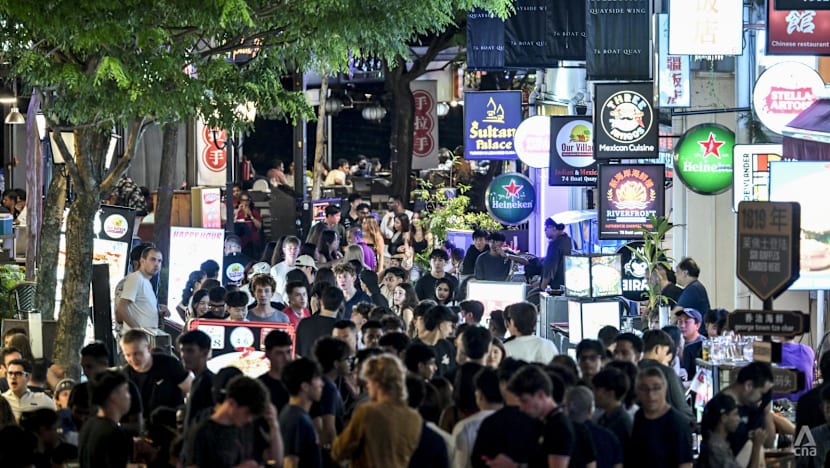As bars stay open later, calls grow for late-night public transport options in Singapore
Authorities cite cost and operational constraints for the absence of late-night public transport services, even as nightlife operators and patrons push for improved connectivity.

Crowds throng the waterfront along Boat Quay around 11pm on Aug 22, 2025. (Photo: CNA/Wallace Woon)

This audio is generated by an AI tool.
SINGAPORE: Bars along the Singapore River now stay open later, but revellers still face a familiar problem – no late-night public transport to get them home.
A year-long pilot, launched on Aug 18, allows liquor licensees in Clarke Quay, Boat Quay and Upper Circular Road to extend their hours to 4am on Fridays and Saturdays. The move is part of a broader government plan to revitalise the nightlife districts.
But the move has not been accompanied by a return of late-night public transport services, which were discontinued in June 2022 due to low ridership.
In response to queries from CNA, the Land Transport Authority (LTA) said buses and trains already run for about 18 hours a day, from 6am to midnight.
“We have to balance the demand for late-night travel with keeping the overall cost of public transport affordable and not incur significant costs in subsidising a very small minority of commuters,” LTA said.
Extending services would also cut into the narrow overnight maintenance window, it added.
But industry players argue that transport access is crucial for the sector’s recovery.
“Transport accessibility is a key part of supporting a vibrant and safe nightlife economy,” said Singapore Nightlife Business Association president Danny Loong.
Better late-night connectivity could encourage responsible patronage and support nightlife businesses, he added.
Mr Loong said feedback from members has been largely positive since the pilot began, but challenges persist, especially when it comes to the lack of transport, rising costs and manpower shortages.
RELOOK PUBLIC TRANSPORT OPTIONS
Singapore University of Social Sciences economist Walter Theseira said late-night public transport is often not cost-effective or viable, requiring off-hours staffing and higher subsidies for fewer riders.
Even with higher fares, these services may not be as cost-effective as daytime public transport, he said.
Mr Edward Chia, deputy chairperson of the government parliamentary committee for finance and trade and industry, said that annual bus transport subsidies currently exceed S$1 billion (US$778 million).
The shortage of bus drivers also poses a challenge, and running late-night services would mean fewer drivers are available during peak transport times, said Mr Chia, who is also an MP for Holland-Bukit Timah GRC.
Associate Professor Theseira added that running the train system 24/7 would also compromise its reliability, as Singapore’s rail infrastructure depends on overnight shutdowns for maintenance.
Still, he said the lack of late-night services in Singapore “stands out in a bad way” compared to global cities like London and New York, and suggested exploring limited bus routes on a cost-recovery basis.
Mr Chia suggested that autonomous vehicles could eventually help address the issue.
RIDE-HAILING COSTS ADD UP, REVELLERS SAY
For patrons, the lack of public transport often translates to high ride-hailing fares, especially when surge pricing kicks in around closing time.
Flight operations executive Vanessa Loh, 33, who stays out until around 3am twice a week, said she compares ride-hailing apps for the best fare. She recalled the old NightRider buses and said reinstating them would help late-night patrons.
Ms Toh Jia Yi, 24, has a late night out once every few months, staying out as late as 4am. She said getting a car on ride-hailing apps can be difficult, especially at popular locations, and affordability is a "huge concern".
Digital engineer Quah Shi Han hangs out with his friends until at least 3am every weekend, and a private-hire ride home costs up to S$50 each time.
"If there are public transport options late at night, the nightlife sector would perform better as the overall cost will go down and people will be more willing to go out till late," the 21-year-old said.
OTHER TRANSPORT SOLUTIONS
LTA said private bus operators can apply to run late-night services if there is sufficient commercial demand. It also pointed to the availability of taxis and ride-hailing options.
Some ride-hailing firms have introduced their own schemes. TADA offered a “Late Night Quest” promotion in March, giving riders up to S$7 off trips between 10pm and 5am, and is considering another run.
Grab has partnered CQ @ Clarke Quay, as the riverside destination is now called, to give S$8 off rides from the venue between 2am and 5am on weekends until Oct 11.
A CQ spokesperson said while transport plays a key role, visitor dwell time is also shaped by food, entertainment and lifestyle offerings. Its anchor nightlife tenant Zouk has renewed its lease, and the district is hosting themed events such as Oktoberfest.
Mr Loong noted that most private-hire partnerships are operator-driven, but the nightlife association is exploring collective arrangements to ease costs across the industry.
The Ministry of Trade and Industry said it will continue to work with stakeholders to ensure that Singapore's nightlife sector remains vibrant and adapts to changing trends.
It pointed to sober partying at Funan mall’s For Real Fest 2025 as one example of how Singapore is diversifying after-dark experiences.
“Such initiatives showcase Singapore’s creativity and culture while keeping our nighttime offerings fresh and relevant for both locals and visitors, and reflect our broader approach to supporting a diverse mix of traditional and emerging concepts that create memorable experiences after dark,” it said.
















